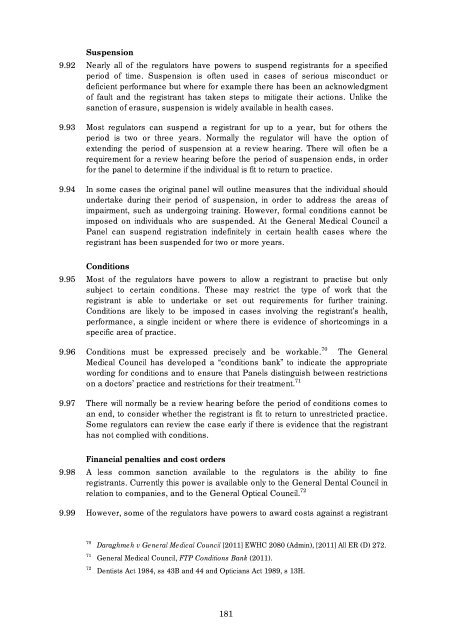Regulation of Health and Social Care Professionals Consultation
Regulation of Health and Social Care Professionals Consultation
Regulation of Health and Social Care Professionals Consultation
You also want an ePaper? Increase the reach of your titles
YUMPU automatically turns print PDFs into web optimized ePapers that Google loves.
Suspension<br />
9.92 Nearly all <strong>of</strong> the regulators have powers to suspend registrants for a specified<br />
period <strong>of</strong> time. Suspension is <strong>of</strong>ten used in cases <strong>of</strong> serious misconduct or<br />
deficient performance but where for example there has been an acknowledgment<br />
<strong>of</strong> fault <strong>and</strong> the registrant has taken steps to mitigate their actions. Unlike the<br />
sanction <strong>of</strong> erasure, suspension is widely available in health cases.<br />
9.93 Most regulators can suspend a registrant for up to a year, but for others the<br />
period is two or three years. Normally the regulator will have the option <strong>of</strong><br />
extending the period <strong>of</strong> suspension at a review hearing. There will <strong>of</strong>ten be a<br />
requirement for a review hearing before the period <strong>of</strong> suspension ends, in order<br />
for the panel to determine if the individual is fit to return to practice.<br />
9.94 In some cases the original panel will outline measures that the individual should<br />
undertake during their period <strong>of</strong> suspension, in order to address the areas <strong>of</strong><br />
impairment, such as undergoing training. However, formal conditions cannot be<br />
imposed on individuals who are suspended. At the General Medical Council a<br />
Panel can suspend registration indefinitely in certain health cases where the<br />
registrant has been suspended for two or more years.<br />
Conditions<br />
9.95 Most <strong>of</strong> the regulators have powers to allow a registrant to practise but only<br />
subject to certain conditions. These may restrict the type <strong>of</strong> work that the<br />
registrant is able to undertake or set out requirements for further training.<br />
Conditions are likely to be imposed in cases involving the registrant’s health,<br />
performance, a single incident or where there is evidence <strong>of</strong> shortcomings in a<br />
specific area <strong>of</strong> practice.<br />
9.96 Conditions must be expressed precisely <strong>and</strong> be workable. 70 The General<br />
Medical Council has developed a “conditions bank” to indicate the appropriate<br />
wording for conditions <strong>and</strong> to ensure that Panels distinguish between restrictions<br />
on a doctors’ practice <strong>and</strong> restrictions for their treatment. 71<br />
9.97 There will normally be a review hearing before the period <strong>of</strong> conditions comes to<br />
an end, to consider whether the registrant is fit to return to unrestricted practice.<br />
Some regulators can review the case early if there is evidence that the registrant<br />
has not complied with conditions.<br />
Financial penalties <strong>and</strong> cost orders<br />
9.98 A less common sanction available to the regulators is the ability to fine<br />
registrants. Currently this power is available only to the General Dental Council in<br />
relation to companies, <strong>and</strong> to the General Optical Council. 72<br />
9.99 However, some <strong>of</strong> the regulators have powers to award costs against a registrant<br />
70 Daraghmeh v General Medical Council [2011] EWHC 2080 (Admin), [2011] All ER (D) 272.<br />
71 General Medical Council, FTP Conditions Bank (2011).<br />
72 Dentists Act 1984, ss 43B <strong>and</strong> 44 <strong>and</strong> Opticians Act 1989, s 13H.<br />
181
















